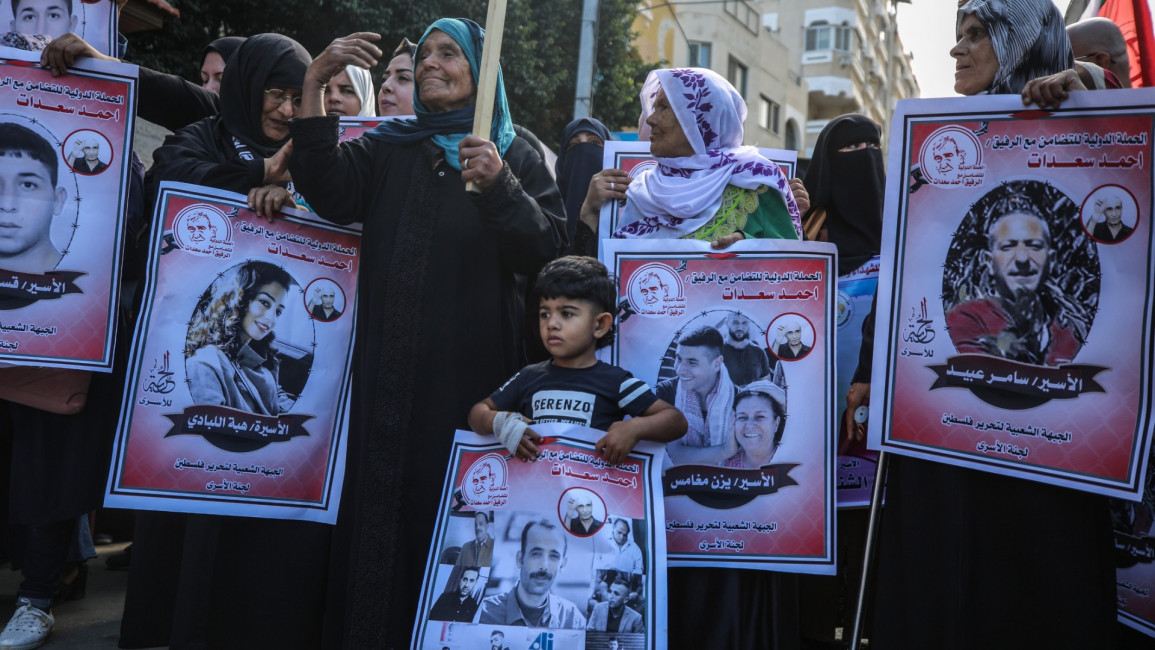Palestinian prisoners begin hunger strike against 'systemic abuse' in Israeli jails
Hundreds of Palestinian prisoners in Israeli jails began an open hunger strike on Wednesday to protest punitive measures imposed by Israel after the Gilboa prison break in September.
Five of the six Gilboa prison breakers belong to the Palestinian Islamic Jihad (PIJ) group, which led the Israeli jails authority to target those affiliated with the faction. These measures included the separation and transfer of some 400 PIJ prisoners to different jails.
A PIJ source initially suggested that all PIJ prisoners would take part in the hunger strike. However, around 250 prisoners took up the call to refuse food.
Palestinian prisoners starting mass hunger strikes today in protest at systematic abuse in Israeli jails. It’s a last ditch cry for help from a ppl whose lives have been crushed under the jackboot of Israeli fascism. Love & solidarity. #FreePalestine pic.twitter.com/fmXsi1F0ni
— GhostofDurruti (@RobTheRich0001) October 13, 2021
"Inhumane living conditions"
Ex-hunger striker and spokesperson for PIJ, Khader Adnan, told The New Arab that “scattering PIJ prisoners across hundreds of prison sections means the destruction of the PIJ organisational structure inside prisons. This is why the PIJ prisoners adopted the extreme form of protest, back in September, which is burning their own cells”.
On Saturday, Palestinian human rights group Addameer reported that 19 prisoners who had set their cells on fire in protest against their transfer had been returned to their burned cells "completely stripped of personal needs, under extremely dire and inhumane living conditions".
PIJ prisoners had announced an open hunger strike in mid-September to protest the transfers as well as the repeated violent raids on prisoners, especially in the Naqab prison. Eventually the hunger strike was suspended.
Adnan explained that “the Israeli Jails authority offered a verbal compromise, back then, to undo all the measures undertaken against prisoners. Unfortunately, that commitment was not honoured, which made prisoners take protest action in the last two weeks, leading to the hunger strike”.
For nearly two weeks, prisoners affiliated with PIJ have reportedly boycotted the morning counting routine and refused to go to the prison yard or leave their cells, unless shackled. According to Adnan, “these steps were meant to gather support by the rest of Palestinian prisoners before beginning the hunger strike”.
Israeli Prison Services returned prisoners to burnt cells in Section 6, completely stripped of personal needs under extremely dire & inhuman living conditions in punitive measures indefinitely, without any indication of their time in confinement. https://t.co/aC0yQIOyUV
— Addameer –الضمير (@Addameer) October 11, 2021
Growing support
Support for the hunger strike has been growing, with prisoners affiliated to the Popular Front for the Liberation of Palestine (PFLP) saying in a statement on Tuesday that between 100 and 120 PFLP-affiliated prisoners will join the action. The PFLP prisoners’ statement affirmed that “the main objective of this hunger striker is to halt the Israeli offensive against prisoners, especially transfers, and return to the conditions prior to the Gilboa prison break”.
Adnan pointed out that “the longer the hunger strike will last, the more prisoners from more organisations are likely to join”.
Prisoner hunger strikes have in the past enjoyed cross-factional support. In April 2017, Palestinian prisoner and Fatah leader Marwan Barghouti announced a hunger strike on his own and was joined by 1,500 prisoners from all affiliations. The strike lasted 40 days, accompanied by a wave of protests across the West Bank that saw road-blocking and clashes with the Israeli army.
The last time Palestinian prisoners carried out a collective hunger strike was in April 2019, following a series of violent Israeli raids against prisoners in the Naqab (Negev) prison.
Updated on 21 October 2021


![Minnesota Tim Walz is working to court Muslim voters. [Getty]](/sites/default/files/styles/image_684x385/public/2169747529.jpeg?h=a5f2f23a&itok=b63Wif2V)




![An Israeli air strike on Jabalia killed teenage journalist Hassan Hamad [Screengrab/X]](/sites/default/files/styles/image_330x185/public/2024-10/hassan%20hamad1.jpg?h=c12e0b96&itok=Rd_dyCVp)

![Israeli strikes on Beirut [Getty]](/sites/default/files/styles/image_330x185/public/2176155077.jpeg?h=a5f2f23a&itok=Xq7ypWgM)